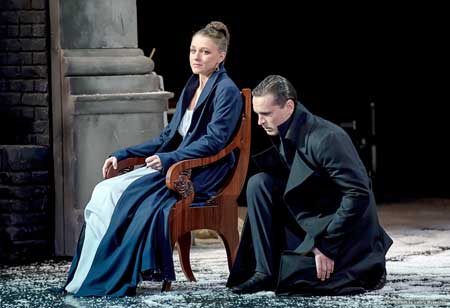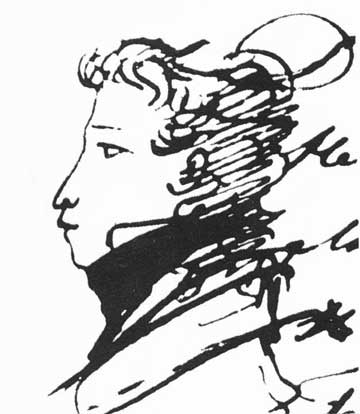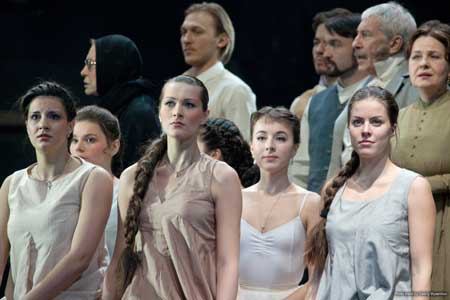Play
based on the poem Eugene Onegin (1833) by Alexander Pushkin
Directed by Rimas Tuminas
Vakhtangov State Academic Theatre of Russia
Cherry Orchard Festival
ArtsEmerson
Cutler Majestic Theater
Boston, MA
June 6-7, 2014

Viktor Dobronravov as Young Onegin
in “Eugene Onegin”
Photo: Valeriy Myasnikov
Courtesy of Cherry Orchard Festival
Eugene Onegin is a roué, a playboy, a not very nice fellow, but he catches the eye of a charming young woman, Tatyana, to whom he pays no attention. Instead he dallies with Olga, the fiancée of his friend, Lensky, who subsequently challenges Onegin to a duel and is killed by him. Later on, Tatyana marries into high society and Onegin, not realizing the countess she has become is actually the same Tatyana, falls for her and tries to seduce her. Though she is still in love with Onegin, she rebuffs him and remains true to her husband.
It’s a tragedy all around, but Pushkin’s poem is considered the highest of the high in Russian culture, revered deeply as an iconic work.
So, it was no surprise to find the Cutler Majestic Theater teeming with Russian speakers for one of the two performances of this long, but innovative, production. And, I suppose, it was no surprise either, at the end, to find this gathering of Slavs and slavophiles leaping to its feet in adoration.

by Alexander Pushkin
All of it was in Russian, with supertitles projected high overhead. The performance was about three and a half hours long with one intermission, and its text was a recitation of extended excerpts from the poem. Occasionally the actors spoke in the context of their roles, but more often than not they exhibited, through gesture and dance, the action of the poem.
The staging was innovative and quite interesting much of the time, but the pace was attenuated and the tone fairly homogeneous throughout. There were nice touches – a woman with a moppy wig and small balalaika-like instrument played a dog. Olga, the coquettish sister of Tatyana, played an accordion. And there was a team of lovely dancers who provided background support, much like a Greek Chorus, for the duration.

in “Eugene Onegin”
Photo: Valeriy Myasnikov
Courtesy of Cherry Orchard Festival
The acting was decent, but I was only really struck by one of the choral members who did a particularly funny and deep-throated rendition of a song.
The staging was curious, and had some wonderful touches – the snow, blown across the stage at various points, was mesmerizing – but the depicted action was a bit monotonous, not quite energetic enough to support a long recitation of dramatic poetry.
I had seen Tchaikovsky’s Eugene Onegin not long ago and had a sense of the power the music had added to the tragic drama. Though its libretto includes passages from Pushkin, its commitment to the original is seemingly far less comprehensive than for this performance of almost pure recitation; it was a unique and fascinating experience therefore to hear so much of the Pushkin in the original and to see it supported dramatically here in this way.
I imagine if I were able to understand the Russian as much of the audience did, drinking it in directly rather than sharing my attention between the action and the elevated supertitled translations, I would have had more of the passionate engagement they did with this performance, perhaps even being stirred to my feet at the end by its combination of native lyricism and inventive portrayal.
– BADMan
Leave a Reply